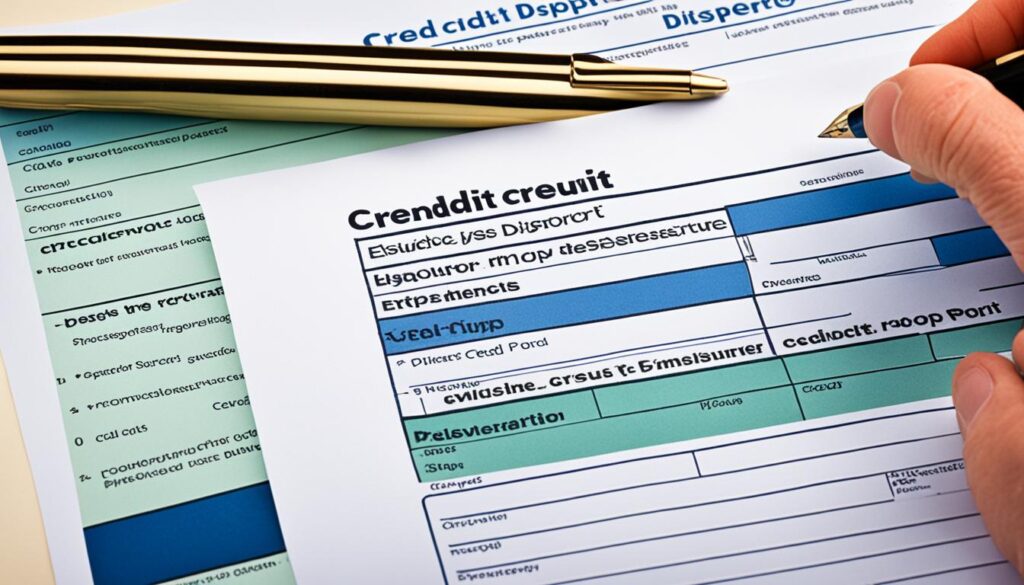Your credit report is vital for your financial life. Lenders, landlords, and employers use it to assess your reliability. Errors in this document can harm your financial health.
Credit report disputes can help fix these mistakes. Learning when and how to dispute credit entries can greatly improve your financial situation.
Credit report errors happen more often than you’d expect. These can range from simple typos to serious issues like identity theft. Such mistakes can unfairly lower your credit score.
Spotting and challenging these errors is crucial. It’s an important step in protecting your financial well-being. Knowing your rights and the correct steps to take is key.
Key Takeaways
- Credit report accuracy is vital for financial health
- Errors in credit reports are common and can be disputed
- Understanding valid reasons for disputes is crucial
- Provisional credit disputes can be used in certain situations
- Regular credit report checks help catch errors early
- Disputing errors can potentially improve your credit score
Understanding Credit Reports and Their Importance
Credit reports are vital for your financial life. They show your credit history, which lenders use to judge your creditworthiness. Knowing these reports helps you manage money and boost your credit score.
What is a credit report?
A credit report is a detailed record of your credit history. It includes info on your credit accounts, payment history, and public records. This document acts as a financial report card.
It reflects your creditworthiness to potential lenders. Understanding your credit report is key to financial success.
How credit reports affect your financial life
Your credit report greatly impacts your financial opportunities. Lenders, landlords, and employers may check it to make decisions. A good report can lead to better loan terms.
It can also result in lower interest rates. Plus, it increases your chances of approval for credit cards or loans.
“Your credit report is like a financial fingerprint, unique to you and telling your financial story.”
The role of credit bureaus
Credit bureaus are the keepers of your credit information. The three major bureaus are Equifax, Experian, and TransUnion. They collect and maintain credit data.
These bureaus play a crucial role in the credit bureaus dispute process. This process is key for improving your credit score.
| Credit Bureau | Key Function | Dispute Method |
|---|---|---|
| Equifax | Collects credit data | Online, mail, phone |
| Experian | Maintains credit reports | Online, mail, phone |
| TransUnion | Provides credit scores | Online, mail, phone |
Knowing about credit reporting helps you control your financial health. It allows you to work towards improving your credit score. Take charge of your credit today.
Common Errors Found in Credit Reports
Credit reports often have mistakes that can hurt your finances. Knowing these errors helps you fix your credit history. Let’s look at some common issues you might find.

Incorrect personal details are a top credit report mistake. Your name, address, or Social Security number might be wrong. These errors can mix up your file with someone else’s.
Account status errors are another common problem. A closed account might show as open. A paid-off debt could appear as still owed.
Outdated negative information often lingers on reports. Most negative items should drop off after seven years. If you see old debts, it’s time to dispute them.
| Error Type | Impact | Action Needed |
|---|---|---|
| Incorrect Personal Info | File mix-ups, Identity issues | Verify and correct details |
| Wrong Account Status | Lower credit score | Provide proof of correct status |
| Outdated Negative Items | Unfair score reduction | Request removal of old entries |
Check your credit report often to spot issues early. If you find errors, challenge the wrong information. Fixing your credit history can open up better financial chances.
Identity Theft and Fraudulent Accounts
Identity theft can severely damage your credit report. It’s vital to recognize fraud signs and act fast. Quick action helps resolve issues and maintain good credit standing.
Signs of identity theft on your credit report
Keep an eye out for these red flags:
- Unfamiliar accounts or inquiries
- Sudden drops in your credit score
- Incorrect personal information
- Unexpected changes in account balances
Steps to take if you suspect fraud
If you spot signs of identity theft, act quickly:
- Place a fraud alert on your credit reports
- Contact the companies where fraud occurred
- File a report with the Federal Trade Commission
- File a police report if needed
How to dispute fraudulent accounts
To resolve identity theft issues, follow these steps to dispute fraudulent accounts:
| Step | Action |
|---|---|
| 1 | Gather evidence of fraud |
| 2 | Contact the credit bureaus in writing |
| 3 | Provide detailed information about the fraudulent accounts |
| 4 | Request removal of fraudulent items |
| 5 | Follow up regularly until resolved |
These steps help protect your credit from identity theft’s harmful effects. Stay vigilant and act promptly to safeguard your financial well-being.
Outdated or Inaccurate Personal Information
Your credit report shows your financial life. Blurry snapshots can cause serious problems. It’s vital to fix credit history issues quickly.
Common errors include wrong addresses, misspelled names, or incorrect birth dates. These small mistakes can have big effects. A wrong address might mean missing important account notifications.
To fix these issues:
- Review your credit reports regularly
- Mark any outdated or incorrect information
- Contact the credit bureaus to dispute errors
- Provide supporting documents to prove correct information
You can get one free credit report from each bureau yearly. Use this chance to check for mistakes. Fixing errors helps keep your credit profile healthy.
Don’t wait to address credit report errors. Quick action prevents long-term damage. Outdated info can limit your financial chances.
“Your credit report is your financial ID. Keep it accurate, keep it current, and it will serve you well.”
Stay alert and take action to keep your credit report accurate. A correct report is key for loans, renting, and jobs.
Incorrect Account Statuses and Balances
Credit reports greatly influence your financial life. Errors in account details can hurt your creditworthiness. It’s crucial to dispute credit entries that don’t match your financial reality.
Types of Account Status Errors
Common account status mistakes include:
- Closed accounts listed as open
- Open accounts marked as closed
- Paid-off debts shown as outstanding
- Accounts wrongly labeled as delinquent
Verifying Account Balances
To ensure accuracy, follow these steps:
- Gather recent statements from creditors
- Compare balances with your credit report
- Note discrepancies for each account
Disputing Incorrect Information
When challenging inaccurate information, be ready to:
| Step | Action |
|---|---|
| 1 | Contact the creditor directly |
| 2 | File a dispute with credit bureaus |
| 3 | Provide supporting documentation |
| 4 | Follow up on dispute status |
Quick action on errors can shield your credit score from harm. Keep an eye on your reports regularly.
Catch and fix mistakes early to maintain a healthy credit profile. Your financial future depends on accurate credit information.
Provisional Credit Dispute: What It Is and When to Use It
Grasping the provisional credit dispute process is vital when facing credit report issues. This temporary measure provides financial relief during case reviews. It’s a crucial step in the credit bureaus dispute process.
Provisional credits typically appear within days of filing a dispute. They stay on your account until the investigation ends. If resolved in your favor, the credit becomes permanent.

Provisional credit serves as a safety net during dispute resolution. It ensures you’re not left without funds while awaiting a decision.
“Provisional credit acts as a safety net, ensuring you’re not left without funds while your dispute is being resolved.”
Consider initiating a provisional credit dispute in these scenarios:
- Unauthorized transactions on your account
- Billing errors or overcharges
- Services or goods not received as promised
- Fraudulent activity on your credit report
To start, contact your bank or credit card issuer right away. Provide all relevant documentation to support your claim. Quick action is key in the credit bureaus dispute process.
| Step | Action | Timeline |
|---|---|---|
| 1 | Notify bank of dispute | Immediately upon discovery |
| 2 | Submit supporting documents | Within 10 business days |
| 3 | Receive provisional credit | Usually within 10 business days |
| 4 | Await investigation results | Up to 90 days |
Stay active throughout the process. Follow up with your bank and credit bureaus regularly. This ensures a timely resolution of your dispute.
Duplicate Entries and Mixed Files
Credit report errors can harm your financial health. Duplicate entries and mixed files are common issues. These mistakes can lower your credit score unfairly.
It’s important to spot these errors quickly. Look for repeated accounts or transactions. Check for unfamiliar addresses or job histories. Watch out for accounts you don’t recognize.
If you find problems, act fast. Free credit repair online tools can help you dispute errors. Contact credit bureaus with proof of the mistakes.
“Your credit report is your financial DNA. Protect it fiercely and correct it promptly.”
Fixing errors can improve your credit score. This can lead to better financial chances. Review your credit reports often. Catch and fix any mistakes quickly.
Negative Information That Has Exceeded the Reporting Time Limit
Outdated negative information can hinder your credit score improvement. Knowing reporting time limits helps maintain good credit and dispute inaccuracies effectively.
Understanding Reporting Time Limits
Different types of negative items have specific reporting periods:
- Late payments: 7 years
- Bankruptcies: 10 years (Chapter 7), 7 years (Chapter 13)
- Foreclosures: 7 years
- Collections: 7 years from the original delinquency date

Identifying Outdated Information
Review your credit report carefully to spot time-barred negative entries. Check dates for each negative item and compare them to reporting time limits.
Look for accounts that seem older than the allowed reporting period.
Disputing Time-Barred Entries
If you find outdated negative information, follow these steps to dispute it:
- Gather evidence showing the item’s age
- Write a dispute letter to the credit bureaus
- Include copies of supporting documents
- Request removal of the outdated item
Actively disputing time-barred entries can boost your credit score. This helps maintain good credit standing over time.
Check your credit report regularly to catch and address issues promptly.
Conclusion
Your credit report is crucial to your financial life. Regular reviews and quick action on errors maintain a healthy credit profile. The credit bureaus dispute process is a powerful tool for fixing inaccuracies.
Monitoring your credit report is an ongoing task. It helps you catch identity theft, outdated info, and wrong account statuses fast. Stay alert to keep your credit in good shape.
Taking control of your credit health boosts your financial power. It can lead to better loans, lower interest rates, and more money options. Make credit report checks a habit and dispute errors promptly.
Your future self will be grateful for the work you do now. Keep up the good work on your credit health!

